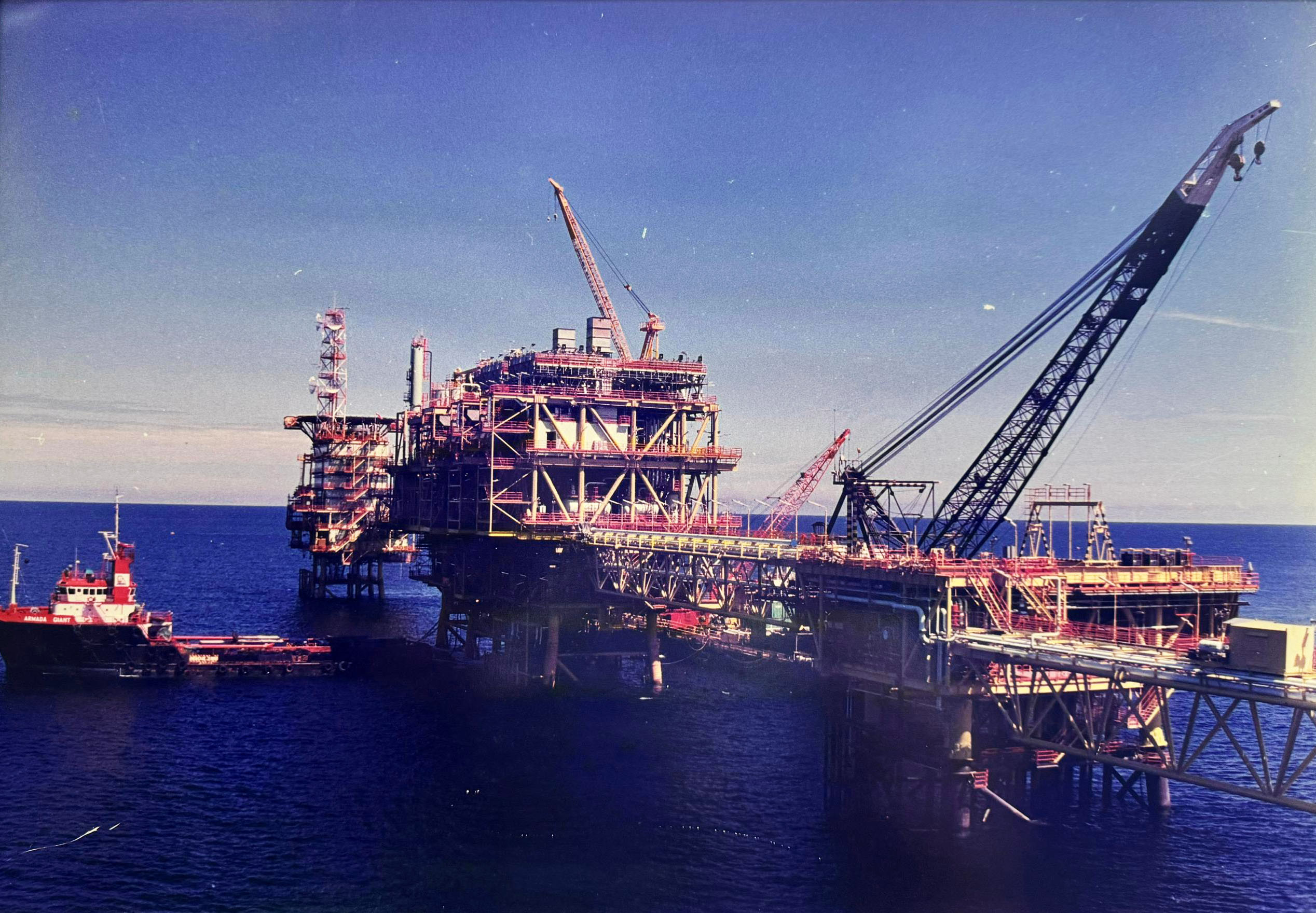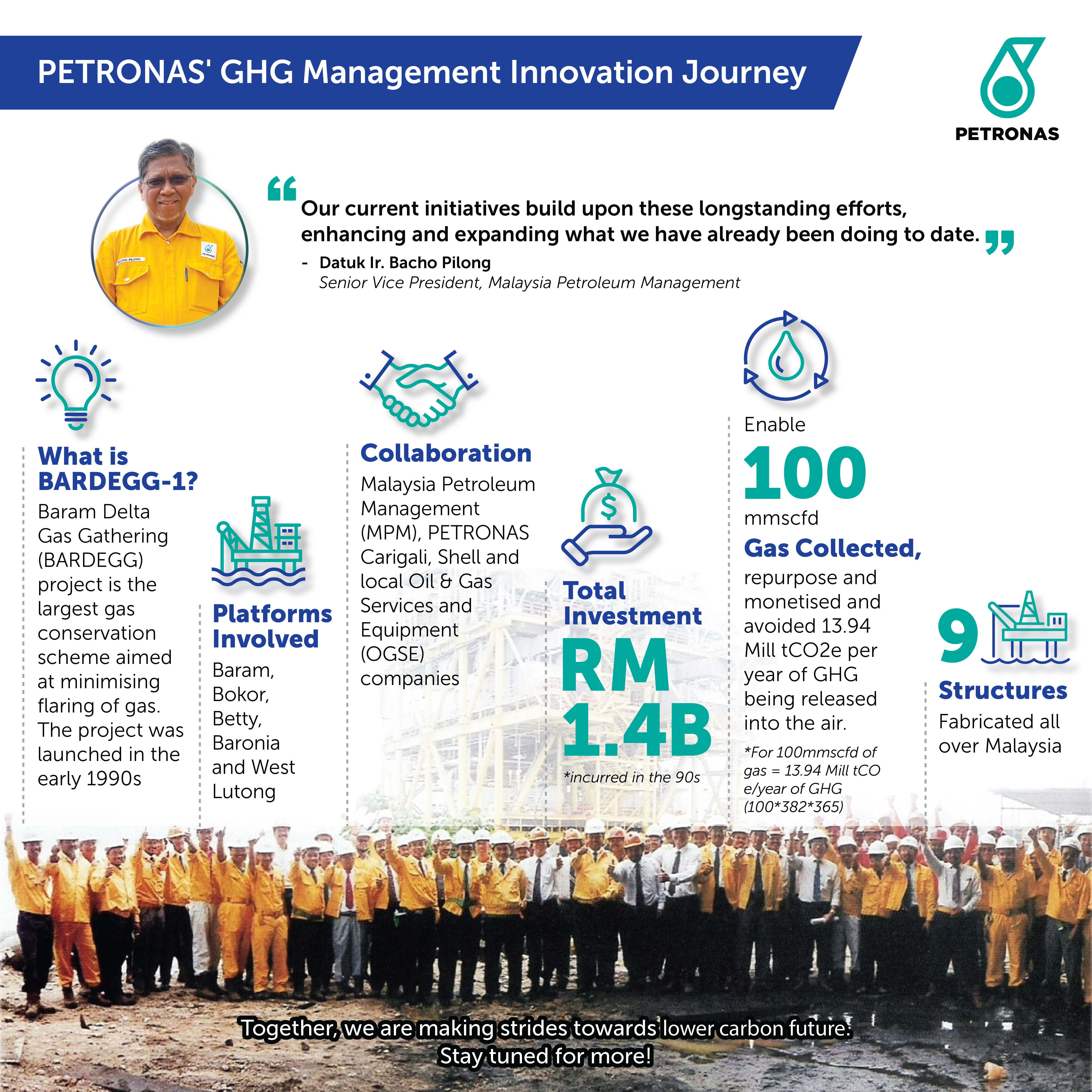
PETRONAS' Journey in Greenhouse Gas (GHG) Management Innovation
Initiated in the early 1990s, BARDEGG-1 is Malaysia's largest gas conservation scheme, aimed at minimising gas flaring—a prevalent practice in oil and gas operations at the time. This groundbreaking project was a collaborative effort between Malaysia Petroleum Management (MPM) and the operator, PETRONAS Carigali and its partner, Shell and the local Oil & and Gas Services and Equipment (OGSE) companies. The project focused on capturing and utilising associated gas from five key fields: Betty, Bokor, Baram, Baronia and West Lutong. By collecting and compressing the gas, BARDEGG-1 set the stage for sustainable energy production.
By implementing advanced hydrocarbon gas capture, compression and transportation technologies, BARDEGG-1 has significantly reduced flaring thus cutting hydrocarbon venting volumes since its inception. The project conserves valuable natural gas by repurposing over 100 Million standard cubic feet per day of associated gas annually that would otherwise be wasted and avoided *13.94 Mill tCO2e per year of GHG being released into the air.
*For 100 MMscfd reduction the equivalent GHG reduction is 100* 382 * 365= 13.94 Mill tCO2e/year

Powering Tomorrow: Harnessing Technology for Efficient Gas Utilisation
The technological innovations implemented in BARDEGG-1 played a crucial role in enabling PETRONAS and its partners to optimise the utilisation of collected gas across various offshore petroleum operations. This project facilitated gas reinjection and gas lifts, leading to improved oil recovery rates and prolonged the lifespan of the fields. Moreover, the captured gas was utilised as a cleaner fuel source for offshore facilities, reducing the dependence on more carbon-intensive energy alternatives.
Additionally, BARDEGG-1 established a direct supply chain to key downstream facilities, including the Miri Crude Oil Terminal (MCOT) in Miri and the Malaysia Liquefied Natural Gas (MLNG) plant in Bintulu, Sarawak. By supplying gas to these facilities, the project supported the broader energy ecosystem, ensuring that the captured gas was not only conserved but also monetised, contributing to Malaysia's economic growth and energy security.
Milestone Achievement: First Gas Export
The first gas exported from BARDEGG-1 in 1993 was an operational success. It showcased PETRONAS’ capability to deliver complex, large-scale projects while prioritising environmental considerations. This achievement underscored the strategic importance of BARDEGG-1 in the country’s energy landscape, demonstrating how collaborative efforts by the industry players can drive innovation and deliver sustainable outcomes.
Laying the Foundation for PETRONAS' Net Zero Carbon Emissions (NZCE) 2050 Aspiration
The BARDEGG-1 project laid a robust foundation for PETRONAS in addressing innovative solutions in GHG management reflecting the company's proactive approach to environmental stewardship. This initiative became an integral part of PETRONAS' broader strategy to enhance operational efficiency, aligning with the company's long-term sustainability aspirations.
The BARDEGG project has continued to evolve, culminating in the launch of the BARDEGG-2 initiative in 2017. This initiative focuses on the development of two fields, Tukau Timur and Baronia, with the goal of harnessing remaining non-associated gas resources to support the PETRONAS LNG Complex (PLC) in Bintulu and provide condensate to the Miri Crude Oil Terminal (MCOT) in Miri, Sarawak as part of Enhanced Oil Recovery (EOR) development.
The BARDEGG-2 project has also seen increased participation from Sarawak local players. Notably, in January 2023, Petroleum Sarawak Berhad (PETROS) acquired equity from Sarawak Shell Berhad (SSB) through its wholly owned subsidiary, Petroleum Sarawak Exploration and Production (PSEP). This strategic partnership has positioned PETROS as an equity partner in the Baram Delta EOR Production Sharing Contract (PSC). BARDEGG-1 remains integral to PETRONAS' mission demonstrating that the energy industry can adapt to the challenges of a lower carbon future. The insights gained and best practices established through the BARDEGG project have paved the way for future upstream developments in Malaysia, with all facilities designed and modified to align with decarbonisation efforts.
Forging Together: A Cleaner Future
PETRONAS stands ready to be a catalyst for change, advancing the journey towards a cleaner, more sustainable energy landscape. The company will continue to collaborate with governments, investors, technology partners, suppliers, customers, academia and communities to accelerate the energy transition, demonstrate sustainability leadership, and collectively pursue the delivery of lower carbon future.
#PETRONAS #MPM #Sustainability #GasConservation #EnergyInnovation #NZCE2050 #GHGManagement





